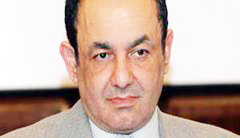Op-ed pages of major Egyptian newspapers have analysed the Muslim Brotherhood’s hostile relations with political groups and many of the country’s institutions. Some writers also called upon the National Salvation Front (NSF) to revise their decision to boycott the elections, arguing that their participation will contribute to forming a brighter future for Egypt’s politics.
The Muslim Brotherhood stands against everyone
Amr Al-Shobaki
Al-Masry Al-Youm newspaper
Al-Shobaki looks into the Muslim Brotherhood’s interactions with political groups operating on the Egyptian political landscape. He starts off his column asking why so many Egyptians stand against the Ikhwan. Some of those who oppose the Islamist group contest the Brotherhood’s structure, while others generally suffer a phobia of Islamists.
In any case, the writer believes the Brotherhood has managed to create hostile relations with many institutions since President Mohamed Morsi took office last June. He cites the Brotherhood’s tense relations with the judicial authority as the main reason why the group’s popularity has been dropping with different political groups.
The Brotherhood pushed Morsi to sack the former prosecutor general and appoint a new one through the executive authority. The Brotherhood’s battle with the prosecutor general has caused the Egyptian people’s trust in the group to decline, states Al-Shobaki. The Islamist group dealt with the judiciary the same way Mubarak did.
The columnist also condemned Muslim Brotherhood members clashing with revolutionary youth in front of the presidential palace, Moqattam and other areas across the country. He concludes by saying that the only way the Muslim Brotherhood could regain the trust of the Egyptian people would be to minimise their use of hate speech and violence.
The National Salvation Front needs to think of the students’ lessons
Emad Al-Din Hussein
Al-Shorouk newspaper
Looking at the results of the student union elections and the Press Syndicate elections, Hussein believes that the participation of the NSF, Egypt’s largest opposition bloc, will lead to a better political future in the country.
Muslim Brotherhood candidates lost in student union elections in different universities and in the latest Press Syndicate elections, and this raises the possibility of the NSF’s success in the upcoming parliamentary elections. Hussein argues that opposition boycotts of upcoming elections would simply pave the way for Islamists to dominate the country’s institutions.
If the NSF does not participate, votes against the Muslim Brotherhood will by default go to the Salafis, who will become the second most powerful bloc in Egyptian politics. Hussein states that according to the Foreign Policy magazine, Salafis hope for an NSF boycott to attract as many votes as possible. He concludes by calling upon the opposition to review their decision to shun the ballot box and to believe that their participation in elections will make a vast difference.





